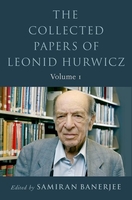Hurwicz Book Project

The Collected Papers of Leonid Hurwicz, Volume 1
Congratulations to Samiran Banerjee on the publication of The Collected Papers of Leonid Hurwicz, Volume 1, from Oxford University Press. This first volume introduces non-specialist readers to the life and work of Leonid Hurwicz, a major figure in modern theoretical economics. The volume also brings together reminiscences from co-authors and colleagues offering insights into Hurwicz as a person and scholar.
Banerjee, one of Hurwicz's last doctoral advisees, is continuing his "labor of love" in compiling Volume 2. Stay tuned for news on the publication date.
On Designing Institutions and Other Essays: Collected Papers of Leonid Hurwicz
Leonid Hurwicz (1917-2008) was a major figure in modern theoretical economics whose many contributions over 65 years spanned at least 5 areas: (1) nonlinear programming, (2) econometrics, (3) decision theory, (4) microeconomic theory, and (5) mechanism design.
In 2007, at age 90, he received the Nobel Prize in Economics (shared with Eric Maskin and Roger Myerson) for pioneering the field of mechanism design and incentive compatibility. This work has impacted resource allocation in all its complexity, from the sale of licenses for the electromagnetic spectrum conducted by the Federal Communications Commission, to the National Resident Matching Program that matches thousands of medical residents with hospitals every year in the United States.
While some of Leo’s papers were published in journals, many remain scattered as chapters in books or were unpublished, and are difficult to obtain. The Heller-Hurwicz Economics Insitute is working with Dr. Samiran Banerjee (’92, PhD), one of Leo's former students, and Oxford University Press, a major not-for-profit publisher, to publish his collected papers in 6 volumes.
In addition to his collected works, the volumes will include prefaces written by his colleagues, co-authors and students which will provide the context for and highlight the importance of his research. Given the scattered nature of Leo's publications spanning over 65 years and the many papers that he did not publish, this project will preserve his legacy and enable future researchers to build on his work.